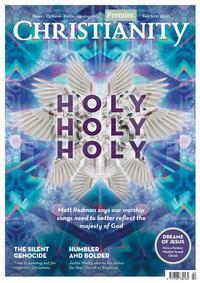In looking at the Church's music, Matt Redman wonders if we’re in danger of overlooking an integral part of God’s character

Everybody worships. Whether Christian or atheist, you will find someone or something upon which to spend your heart, mind and soul. The question has never been if we will worship. Instead, we must ask who we will worship.
Human beings have been created to worship the living God – as Psalm 150:6 says: “Let everything that has breath praise the Lord.” The Westminster Shorter Catechism says a person’s “chief end” is to “glorify God, and to enjoy him forever”. Augustine noted that our hearts are restless until they find their home in God, and CS Lewis warned us of the dangers of any other approach – “idols always break the hearts of their worshippers”.
Whenever the biblical writers have a vision of the heavenly throne room, God is always at the centre, and everything else arranges itself around him. The angels encircle him, and every creature present takes their cue from his greatness and glory. When we say: “Let it be ‘on earth as it is in heaven’” (Matthew 6:10), this is essentially what we are asking for. We are asking that Christ would be at the centre, and everything else – our lives, homes, towns and even nations – would be arranged around him and his majesty. True worship, then, is a life that prioritises the worth of God above all else, and then demonstrates that worth through all of our thoughts, words and actions (see Romans 12).
Don't make it up
One of the most striking aspects of our worship is that we worship a God of self-revelation. Imagine how complicated it would be to worship a god who hasn’t already revealed themselves. A god like the one Paul finds in Acts 17.
In Athens he comes across an inscription to an ‘unknown god’. You wouldn’t know where to start with worshiping a godlike that. You’d have no idea how to address him, her or it. You wouldn’t know how to approach, how to behave or what might possibly be a pleasing offering. But when it comes to worshiping the Father, Son and Holy Spirit, it’s a whole different story. We are given an abundance of information about the kind of worship to bring, and how he would have us bring it. God has given us a whole book of self-revelation– the scriptures – where page after page describes in detail his nature, his character, his names, his ways and his story. He tells us what honours him, and what dishonours him. He gives us guidance on worship in the layout and intricate designs of the temple and tabernacle. He unveils glimpses of the heavenly throne – where we’re able to see a pure, untainted example of what holy and heavenly devotion really looks like. In the Bible, there's an astonishing amount of information to help us.
Like it or not, we don’t get to make any of this ‘worship thing’ up. We don’t get to go renegade and decide how worship might suit us best, or how it could be adapted to make us more comfortable. We don’t get to ignore the revelation set before us, or pick and choose the parts we like and don’t like.
It goes without saying that we’ll never be able to fully convey or describe God, and here on earth our worship will always remain a small glimpse of the full force of who it is we are approaching. But it’s essential we endeavour to take a deep-dive, and as best as we know how, to sing worship songs that reflect the God we find described in scripture. Weak revelation ultimately leads to weak response, and dumbed-down songs in the end lead to diluted discipleship.
The missing piece
One hole in much of our congregational worship today is the holiness of God. Without holiness in the mix, I don’t even know if we can call it ‘worship’. It may be admiration, even adoration of some kind – but can it truly be worship if there is no element of awe and astonishment? An essential ingredient of all biblical worship is an acknowledgement of the ‘set-apartness’ of God – that he is holy through and through, and completely off the charts of anything that we could ever fathom or imagine. As the New York-based pastor Jon Tyson reminds us, in his insight into the worship responses of the angels in heaven: “The angels have been locked in a room with God for thousands of years and they still haven’t gotten past the word holy.”
Yes, we get to worship our God as father and friend. Yes, we run into his arms of grace, singing of freedom, joy and healing. We live under this new covenant and the beautiful measure of grace that Christ poured upon us – where we not only get to draw near to God, but we can even do so with confidence (Hebrews 4:16). These are all really important parts of our devotion. But they can never be the whole picture. The holiness of God must always be kept in view.
The glory of Christian worship is found in this mystery: that a God so unfathomably holy and righteous calls us to know him deeply and to draw near to him.
The late translator of The Message, Eugene Peterson, reminded us how awe and closeness are both equally important parts of the equation. In Living the Resurrection (NavPress) he wrote: “The acts of reverence and intimacy need each other. The reverence needs the infusion of intimacy lest it become a cool and detached aesthetic. The intimacy needs to be suffused in reverence lest it become a gushy emotion.” AW Tozer unpacked this dynamic beautifully too in The Knowledge of the Holy (HarperOne): “The greatness of God arouses fear within us, but the goodness of God encourages us not to be afraid of Him. To fear and not to be afraid – that is the paradox of faith.”
The most honouring and healthy worship seeks to include both the immanence and the transcendence of God. The transcendence – that Godis ‘otherly’ and infinitely higher than our reason could ever comprehend, and the immanence – that he gets up close and personal, and deeply involved with our lives. If we ever claim to draw near to Jesus, but all we find is a tame, ordinary, manageable God, we’re probably not half as close as we’d like to think. When we truly draw near to Christ, it’s not just our sense of his grace and kindness that increases in measure. Our awareness of his holiness and majesty will be on the increase too.
The theologian Dr Darrell Johnson explores this theme brilliantly. He teaches us to compare and contrast the heavenly throne scene we find in Isaiah with the one described to us in the book of Revelation since the introduction of the new covenant. In the first scenario, written around 740 BC, we’re told of the seraphim, who have six wings – and who use two of these to cover their faces (Isaiah 6:2). Then we fast-forward to around AD 92, and are presented a second heavenly worship scene. Here, everything is so similar, and yet there are some remarkable differences. We again encounter these creatures with six wings – but this time there's something strikingly different about them. There is absolutely no mention of them covering their eyes – in fact, this time we’re told that they are instead “covered with eyes” (Revelation 4:8). As Johnson points out, there has been a seismic change– and something game-changing must have happened to allow these worshiping creatures to now behold holiness. It is the transcendence and immanence of God, interweaved in a beautiful divine mystery.
Holiness vs helpfulness
One trend worth noting in our current worship lyrics is the tendency to only write and sing about the attributes of God that are directly helpful to us – and perhaps neglect other aspects of his worth because they do not appear to be directly beneficial to our own lives. It is perhaps ‘holiness versus helpfulness’. The challenge we face is to not only sing about God as shepherd and fortress, or other qualities that we recognise as being advantageous for us. We must also sing of him as the holy one, and marvel at those aspects of his nature and character that are worthy of the highest praise, whether or not we are in the picture in any way.
It's a whole other level of praise when we worship God for his infinite worth in and of itself – irrespective of whether or not it enriches our lives. The call in these days is fora few more worship songs where the personal pronoun “I” doesn't even feature. Songs that exist not to reassure us, or to comfort us – but that simply exist to exalt God for the righteous, radiant and holy King that he is. We must make sure to praise him for his holiness– not just for his helpfulness.
There are many other theological pitfalls that we must watch out for as we create and shape our congregational worship responses in 2021, but I believe a lack of emphasis on the holiness of God is our most acute problem.
Tozer once wrote that “our gains are almost all external, and our losses are wholly internal”. Looking back over the last couple of decades, it's easy to see how we’ve taken some big strides forward externally in our gathered worship expressions. For example, in many streams of the Church, production levels have increased hugely. Musicality and creativity have seen some healthy growth too. Many congregations around the world are writing, leading and even recording high-quality worship music. It’s easy to see how we’ve made some improvements in the external expressions of our worship. But what of the internal side of things? Where are we at when it comes to the heart of the matter? Is our theology deepening? Is our spirituality growing? Are healthy disciples being made? Are lives being shaped by a healthy scripture-based worship diet? Is there a wholehearted pursuit of the presence of God? Perhaps in this season we might benefit from taking our foot off the pedal of all things ‘excellence’ and ‘external’, and apply ourselves more intentionally to going deeper than ever in the internal side of things.

The year 2020 is one we’ll never forget – the amount of disruption and disturbance to our normal way of going about things has been immense – including in the area of our congregational worship. Not being able to gather in person has been painful at times. But alongside the discomfort and the chaos, maybe there’s also been a pruning – an opportunity to come out of this moment spirituality sharper than ever before – and focused once again on the things that carry the most importance. Everything has been stripped back, and we’re forced to think through once again what is our highest priority with worship, and what is peripheral. And, indeed, what is missing. Personally it has taken me back to some simple lyrics I wrote more than two decades ago: “I'm coming back to the heart of worship/ And it’s all about You / It’s all about You Jesus.
This article is taken from the February 2021 issue of Premier Christianity. Read more articles on culture, faith and apologetics for only £3.95/month






























